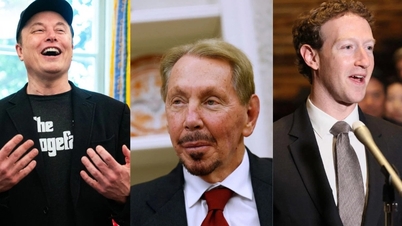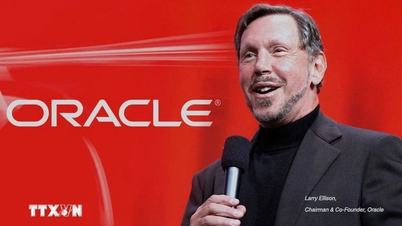"The Millionaire Next Door"
If someone had told you in 2000 that just 25 years later the number of millionaires in the world would quadruple, you might have envisioned an era of super-rich boom, with wealth gaps widening. But the reality paints a much more subtle and surprising picture.
The Swiss bank UBS's Global Wealth Report 2025 has just released some stunning figures, not about the top billionaires, but about a rapidly rising class, the "everyday millionaires", or EMILLI (everyday millionaires). These are individuals with net assets of between 1 and 5 million USD.
At the turn of the millennium, the world had around 13 million EMILLI, and that number has soared to almost 52 million by the end of 2024. Even adjusted for inflation, the number of ordinary millionaires has more than doubled. Not only are they numerous, but they also wield enormous economic power, with their total assets reaching approximately $107 trillion. To put that in perspective, that’s almost equal to the combined $119 trillion worth of assets of the entire ultra-rich group (those with over $5 million).
This phenomenon is not temporary or limited to a few countries, but a global wave, a tectonic movement that is changing the structure of society and the economy. The question is, what machine is creating "millionaires next door" at such a dizzying speed?

While the media often focuses on the super-rich, a wave of “everyday millionaires” (EMILLI) is quietly changing the global wealth landscape (Photo: Getty).
Decoding the "machine" that creates millionaires
The UBS report points out that the rise of EMILLI does not come from a single cause, but is the resonance of four profound socio-economic factors that have been taking place persistently over the past two decades.
Real estate pedestal: "Gold mine" under every family's feet
For most EMILLI, the road to million-dollar wealth doesn’t start with a risky stock investment, but right in the home they live in. Over the past 20 years, real estate prices in most major markets around the world have grown phenomenally.
A home purchased in the early 2000s may have increased in value many times over, pushing the owner's net worth well over the million-dollar mark. Real estate has become a safe haven, a solid foundation for creating a class of millionaires who sometimes don't even realize it.
The "Democratization" of Wall Street: When Investing Is No Longer a Privilege
While investing in the stock market used to require specialized knowledge and a large amount of capital, the technological revolution has completely changed the game. The advent of online trading applications, mutual funds, and exchange-traded funds (ETFs) has opened the doors of Wall Street to millions of ordinary people.
Now, with just a few taps on a smartphone, one can invest in the world's leading companies, diversify their portfolios and accumulate long-term wealth. This ease of access has transformed the financial markets from an elite playground to a tool for the masses.
The Age of Entrepreneurship: Building Your Own Destiny
Unlike previous generations who often stuck with a stable job at large corporations, today's generation is witnessing the explosion of startup culture and freelance work. Many EMILLI are owners of small and medium-sized enterprises, consultants, or people working in the gig economy.
They do not rely on pensions, but proactively build their own income sources, create value and seize business opportunities. This spirit of daring to think and do is a powerful engine for proactive and sustainable wealth creation.
The Inheritance "Tsunami": The Great Transfer of Wealth
This dynamic is likely to shape the wealth landscape most dramatically going forward. UBS estimates that a whopping $83 trillion in wealth will be transferred between generations over the next 20-25 years.
This “Great Wealth Transfer” will propel a large number of millennials and Gen Z into the ranks of millionaires, not starting from scratch, but from the foundations their parents and grandparents built. It’s a wealth tsunami that promises to create even more EMILLI.
One wave, many shades
Although a global trend, the rise of EMILLI has its own regional characteristics:
The United States continues to be at the heart of the EMILLI movement, thanks to a long-standing culture that encourages investment in both real estate and financial markets.
In Europe and Asia, especially in countries with rising property prices and increasing financial literacy, growth has been strong.
Meanwhile, in emerging markets, the number of EMILLI is also increasing, although from a lower starting point. However, their wealth is mainly concentrated in tangible assets such as real estate, rather than financial assets such as stocks or bonds.
What sets the EMILLIs apart is not their background or their snap investment decisions, but a consistent mindset: they are marathon runners, not sprinters.
They focus on accumulating wealth quietly, steadily and with discipline over time. Their lifestyle is often unpretentious, prioritizing reinvestment, saving and smart spending rather than chasing after luxury consumer trends.
It is this "hidden wealth" and sustainability that has created a new economic pillar, stable and less affected by short-term market fluctuations than hasty speculative money flows.
What future awaits?
UBS predicts that the world will have more than 5 million new millionaires by 2029. This suggests that the EMILLI wave is not going to stop. As asset prices continue their long-term upward trend and generational wealth transfers accelerate, the image of the “average millionaire” will become more familiar than ever.
Their rise is not just a story about money. It signals a broader distribution of wealth, a world where the opportunity to get rich is no longer the privilege of a small group.
While the gap between rich and poor remains a major challenge, the rise of the EMILLI class is raising hopes for a more resilient social structure and a healthier global economy, supported by tens of millions of silent but incredibly strong pillars.
Source: https://dantri.com.vn/kinh-doanh/mot-the-gioi-dang-giau-len-am-tham-mot-lan-song-ngam-xuat-hien-20250712195339651.htm









































































































![Dong Nai OCOP transition: [Article 3] Linking tourism with OCOP product consumption](https://vphoto.vietnam.vn/thumb/402x226/vietnam/resource/IMAGE/2025/11/10/1762739199309_1324-2740-7_n-162543_981.jpeg)








Comment (0)